#Building resilience during hardships
Explore tagged Tumblr posts
Text
Pushing through Adversity - What it looks like and What it can do
Adversity is an inevitable part of life. Whether it comes in the form of personal challenges, professional setbacks, or health struggles, everyone will face difficulties at some point. However, how we respond to these challenges can significantly impact our growth and success. Pushing through adversity isn’t about ignoring the pain or struggle but rather embracing it and using it as fuel for…

View On WordPress
#Benefits of resilience in adversity#Building resilience during hardships#Examples of overcoming challenges#How to push through tough times#Lessons learned from adversity#Overcoming adversity strategies#Personal growth through adversity#Strength through adversity stories#The power of perseverance#What pushing through challenges teaches us
0 notes
Text
Using motifs to create thematic depth.
Motifs are one of the most powerful tools a writer has for weaving deeper meaning into a story.
What Is a Motif?
A motif is a repeated element in your story that highlights a theme. While similar to symbols, motifs are more dynamic and can evolve as your characters and story progress.
Symbol: A single red rose representing love. Motif: Flowers appearing throughout the story to represent different aspects of relationships—love, decay, growth, and loss.
Why Use Motifs?
They deepen your story’s meaning. Motifs give your readers something to latch onto, creating a sense of unity.
They enhance immersion. Repeated elements help ground readers in your world.
Tips for Crafting Effective Motifs
1. Choose a Motif That Fits Your Story’s Themes
Ask yourself: What’s the central idea of my story? Your motif should subtly reinforce that idea.
Theme: Resilience in the face of hardship. Motif: Cracked glass—a recurring image of something that’s damaged but still functional, reflecting the characters’ inner strength.
2. Use Motifs to Reflect Character Growth
A well-designed motif can evolve alongside your characters, reflecting their arcs.
In the beginning, a character always wears a watch to represent their obsession with time and control. By the end, they stop wearing the watch, symbolizing their acceptance of life’s unpredictability.
3. Keep It Subtle (But Consistent)
A motif shouldn’t feel like a flashing neon sign. It should quietly enhance the story without overpowering it.
If your motif is rain, don’t make every scene a thunderstorm. Use it sparingly—maybe it rains during moments of emotional turmoil or reflection, creating a subconscious link for the reader.
4. Use Recurrence to Build Meaning
The more your motif appears, the more it will resonate with readers. The key is repetition with variation.
In a story about family bonds, food could serve as a motif.
Early on: A tense family dinner where no one speaks. Later: A shared meal where characters open up and reconnect.
5. Connect Motifs to Emotion
Motifs are most effective when they evoke a visceral reaction in the reader.
Motif: A recurring song. First appearance: A father sings it to his child. Later: The same child hums it as an adult, remembering their father’s love. Final scene: The song plays during the child’s wedding, tying past and present together.
Examples of Motifs in Action
Motif: Mirrors
Theme: Self-perception vs. reality. A character avoids mirrors at first, unable to face their reflection. They slowly start using mirrors to confront their flaws. The final moment shows them standing confidently before a mirror, accepting themselves.
Motif: Keys
Theme: Freedom and control. A character collects keys, searching for one that unlocks their past. They find an old, rusted key, which leads them to uncover family secrets. The motif shifts to symbolize freedom when they lock a door behind them, leaving their past behind.
Motif: Birds
Theme: Longing for freedom. Early scenes show a bird trapped in a cage, reflecting the protagonist’s feelings. Later, the bird is released, symbolizing a turning point in the character’s journey.
Motif: The Ocean
Theme: Emotional depth and uncertainty. Calm waters reflect peace in the protagonist’s life. Stormy seas mirror moments of inner conflict.
Practical Exercise
1. Identify your story’s central theme.
2. Brainstorm objects, actions, or images that resonate with that theme.
3. Introduce the motif subtly early on.
4. Repeat it with variation, tying it to key emotional moments.
5. Bring it full circle by the end, letting the motif reinforce the resolution.
#writerblr#writers#creative writing#creative writing tips#Writing tips#fanfiction#fanfic writing#Fanfic writer#fanfiction writing#fiction writing#writing#am writing#tumblr writing community#writers on tumblr#writing advice#fic writing#writing community#writing inspo#writers on ao3#writers on ao3 writers on tumblr#AO3 fic#ao3 writing community#writing stuff#wip#writers block#writer things#writer life#writer struggles#writing help#xyywrites
915 notes
·
View notes
Text
Empire, Wyoming, was a pioneering African American settlement founded in 1908 near Torrington, Wyoming. The community was established by the Speese and Taylor families from Nebraska, who sought self-sufficiency and political autonomy during a time of widespread racial discrimination.
At its peak, Empire had a population of nearly 50 residents and notable institutions, including a post office, a Presbyterian church led by Reverend Russell Taylor, and a public school established in 1909. Sallie Thistle, a young teacher from Cheyenne, ensured the community’s children received an education. These achievements reflected the settlers’ determination to build a thriving and self-reliant town.
However, Empire faced significant challenges. The settlers practiced dryland farming, which left them vulnerable to recurring droughts. Racial tensions with neighboring communities also posed threats. A tragic turning point occurred in 1913 when Baseman Taylor, one of the settlers, died after reportedly being beaten while in custody. This event demoralized the community and led to its decline.
By the 1920s, many residents had left due to hardships, with some moving south for better opportunities and others returning to Nebraska. By 1930, Empire had effectively disappeared. Today, its legacy is commemorated by historical markers in Wyoming, serving as a testament to the resilience and determination of African American homesteaders who pursued freedom and autonomy in the face of adversity.
#black history#black people#wyoming#american history#black excellence#black americans#black lives matter#blacklivesmatter#black economics
762 notes
·
View notes
Text
Imagine living through more than a year of relentless war, displacement, and unimaginable loss.
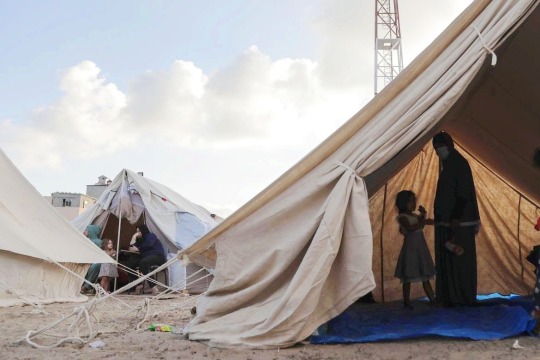
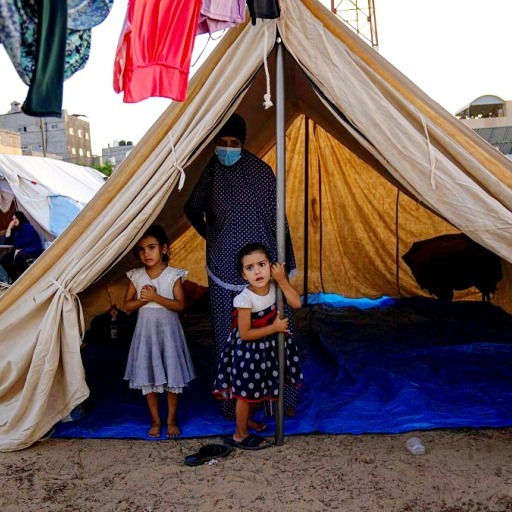
Images: Nader and his two daughters, Laila and Noor.
@nader20000
Story written by @rumiandroses
This is reality for Nader Ahmed Gibril, a 33-year-old father from Gaza, his wife Sally, and their three young children—Laila, Nour, and Ahmed. Once living a peaceful life, their world was turned upside down as their home, a four-story building that housed eight families, was reduced to ashes. In this attack, Nader lost his uncle, cousins, and their children, leaving his family reeling from grief and uncertainty.
The ongoing crisis forced them to flee repeatedly, braving unsanitary conditions, overcrowding, and relentless bombardment. They currently reside in Mawasi Khan Yunis after an arduous displacement journey, living without access to basic necessities like food, clean water, and medical care. With skyrocketing prices and no source of income, the family struggles daily just to survive.
Nader's father was severely injured during one attack and faces challenges in accessing medical care due to the dire healthcare situation in Gaza. Meanwhile, Nader remains the sole provider for his family, determined to shield his children from further suffering despite their harrowing circumstances.
The goal of their fundraising campaign is twofold: first, to secure funds for basic necessities such as food and shelter; second, to save enough to evacuate through the Rafah crossing when it opens, offering a chance to escape the violence and rebuild their lives in safety.
This family has shown extraordinary resilience in the face of unimaginable hardship, but they cannot do this alone. They need our support to turn their hope for safety into a reality.
Every contribution, no matter how small, goes directly to Nader’s family, helping them meet their immediate needs and work toward a safe future.
If you cannot donate, help to amplify Nader's voice by sharing his story.
Let’s come together to offer Nader’s family a glimmer of hope in their darkest hour. Your generosity can provide them with the resources they desperately need to escape and rebuild their lives. Together, we can help them find peace and stability.
You can donate to Nader's Chuffed campaign [HERE].
Nader’s campaign has been vetted by @90-ghost [VETTED LINK] and @bilal-salah0 [VETTED LINK].
#free gaza#gaza genocide#free palestine#gaza#gaza strip#palestine#signal boost#gofundme#humanity#the human family
95 notes
·
View notes
Text
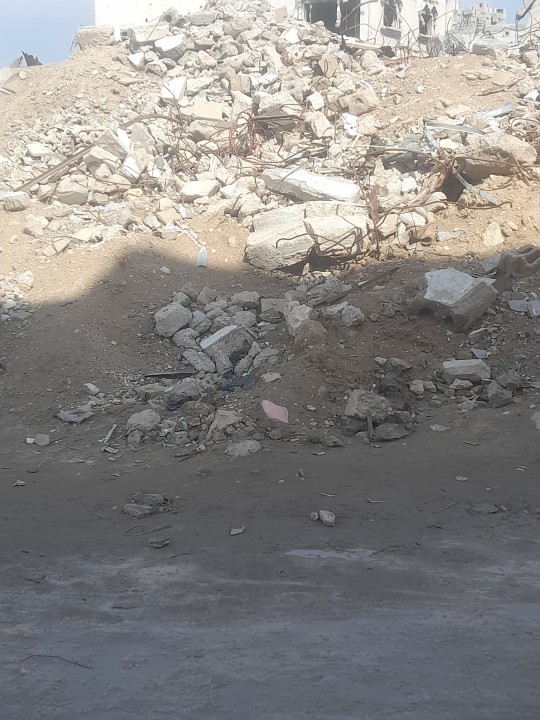
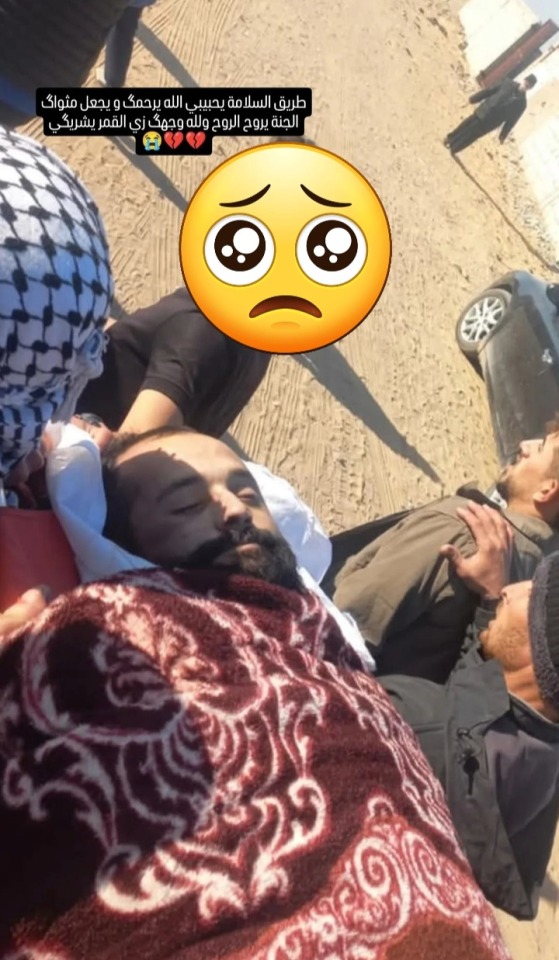
Hello, merciful and generous souls
I am Barakat Al-Taweel
I am communicating with you at a time of unimaginable hardship and fatigue.I am a single young man, 24 years old.I have 12 brothers and sisters in addition to my mother and father.We had a house to shelter us and I was preparing myself for marriage and I had prepared my apartment with great effort.We were living very happily in this small family home and everyone was excited and ready for my wedding🥺💔.Suddenly, without any warning, our lives turned into a hell and conditions beyond human reason.What happened!!!!.Our house was completely destroyed،We were displaced from our place،My brother was martyred on the road during the bombing😢،My apartment, which I had prepared with great and hard work, was destroyed. I am now suffering from major back problems due to the effort I put in at work💔.Oh, that pang in our hearts.At some point, the calm we knew disappeared. The echoes of war destroyed our existence and our being.All that remained for us were the clothes we were wearing and the fragments of our withered dreams.Now we are displaced and suffering from all kinds of pain in life. We lost our home, we lost my brother, and I specifically lost my home, which I was preparing for marriage and settling down. On top of that, we are living in an exorbitantly high cost of living. We need about $100 a day to meet our hunger and needs.Now I have given up my dream of marriage and stability. I have a dream of living with dignity and being able to eat whatever comes to my mind. I also have a dream of traveling abroad to build a new home for my simple family that was lost as a result of the devastating war.Please, consider helping us during these critical times. Every donation, regardless of size, brings us one step closer to safety, stability and a chance to rebuild our lives.With gratitude overflowing from the depths of our hearts, we thank you for every donation, every participation, and every ounce of sympathy you provide to our cause. Your support means more than words can express.together !! We can turn the story of our loss and calamity into a journey of hope and resilience... I thank you from the bottom of my heart for your interest and for your invaluable sou🤲💙
https://gofund.me/8597e73a
#gaza genocide#free gaza#gaza strip#gazaunderattack#gaza#all eyes on palestine#palestine fundraiser#save palestine#free palestine#i stand with palestine#please help#send help
50 notes
·
View notes
Text
Princess Horror of Galdurheim

Horror is over 7 foot tall; a HUNK of a man, all broad and wide, and looks like he could beat your head in with a single hand, which is ironic, because based on the size of the wound in his OWN face, someone had done that to HIM once upon a time. he’s clearly is brain damaged, and speaks very slowly, walks with a limp and moves slowly, like he’s trying to make sure he walks the way he wants to. He dresses in simpler, earth-toned clothing that speaks more of practicality than luxury, pieced together by his region’s limited resources. He prefers ease of range and movement that showy clothing.
Horror is gentle, with a deep love for cooking, baking, and gardening, skills he picked up out of necessity. His kindness is at odds with his intimidating appearance. He has retrograde and short-term amnesia and struggles with memory, often forgetting where he is or who he’s with. Yet he remembers emotions more strongly, forming attachments that linger, even when specific memories don’t.
Horror’s quiet, unpretentious nature endears him to Nightmare, who finds himself drawn to the gentle giant’s compassion. When Nightmare realizes that Horror cooks to help his starving kingdom, his admiration grows, seeing the selflessness in Horror’s actions. As Horror’s memory issues become apparent, Nightmare helps him feel safe, creating a sense of stability for Horror that he hasn’t known for a long time. Horror is first quite scared of Nightmare, though tries not to show it
Killer’s teasing doesn’t bother Horror; he often laughs or takes Killer’s comments in stride, which irritates Killer at first but also softens him over time.
With Dust, Horror is both protective and sympathetic, recognizing the sadness that Dust bears.
Cross and Horror share a quiet understanding - they often sit in silence together, with Cross feeling more comfortable around someone who doesn’t demand conversation.
Horror is actually the ONLY surviving prince/ess of his kingdom. his brother died just 2 months ago to illness, and all his sisters are long gone. their kingdom is starving, and loosing land, so…they need resources, and the best way to do that? marry off their Prince.
-
Galdurheim is known for its agricultural wealth and herbal medicine, though recent years have brought drought and famine, decimating their food stores and weakening their economic power. The kingdom has a strong communal spirit, and its people are known for their kindness and resilience.
Galdurheim values community and self-sufficiency. The kingdom celebrates the Harvest Rite every autumn, a festival where people give thanks for the land’s bounty (or mourn its scarcity) and participate in communal meals. Despite the hardships, the people of Galdurheim are close-knit and support one another, valuing honesty and compassion.
The kingdom’s people are deeply spiritual, worshipping the Earthmother, a deity symbolizing fertility, protection, and the cycles of life and death. Temples to the Earthmother are adorned with offerings of harvested goods, and during troubled times, her statues are often draped with cloth and prayers are written on the fabric in hopes of her mercy.
The kingdoms national symbol is a flower, which Horror wears on his clothing, including his crown and broaches
King Thorne rules Galdurheim, a sombre and resilient ruler known for his humility. Due to the recent tragedies in the royal family - including the loss of Horror’s siblings - Thorne is deeply affected and struggles to maintain hope for their kingdom.
Once a bountiful kingdom, Galdurheim has large stone cottages and grand, open farmhouses. The central palace is grand but in a state of disrepair, with weathered walls and empty fields around it. Galdurheim once took pride in elaborate gardens, now left to overgrowth. Wood structures are common, and buildings are scattered across the landscape, surrounded by empty fields that serve as a reminder of their lost abundance.
Clothing in Galdurheim used to feature soft linen and wool in earth tones, but now it’s patchwork and functional, with only the nobility wearing furs and imported fabrics. The designs are straightforward, with tunics, trousers, and aprons for practicality. Nobles still wear garments adorned with embroidery from better days, but it’s usually worn and faded.
The climate of Galdurheim is cool and damp, with periodic storms that can be brutal, damaging fields and crops. There have been years of cold spells, which, combined with disease and crop failure, have crippled the once-thriving farms.
The famine has pushed Galdurheim into desperation, and though cannibalism is only rumoured, people have become heavily reliant on preserved foods, dried berries, and sparse root vegetables. Mushrooms and foraged goods have become a staple, and some are willing to eat whatever they can to survive. Fish from the kingdom’s rivers and lakes used to provide sustenance but have become scarce due to overfishing.
Animals in Galdurheim have largely fled, but deer and rabbits remain in the forests, hunted heavily. Native plants include wild thyme, yarrow, and hardy roots, with food-bearing plants dwindling under poor growing conditions. This scarcity means they lack the resources for dyes, so their clothing is often a natural, undyed gray or brown.
The loss of Galdurheim’s agricultural bounty has strained trade routes and created political tension, with surrounding kingdoms forced to either increase their own agricultural efforts or find new allies. Durmous and Irelith, reliant on Galdurheim’s grain, are especially affected, leading to skyrocketing prices and increased unrest among their citizens. This scarcity has opened doors for kingdoms like Velegore to exploit the need for resources, setting the stage for both conflict and unexpected alliances among the royal houses.
#undertale au#undertale#undertale au fanart#horror sans#horrortale#horrortale sans#horror!sans#betrothal au#betrothal!au#betrothal!horror#bad sans poly#bad sanses#rues aus#lore dump#lore drop
82 notes
·
View notes
Note
Hi, I am Ahmed from Palestine, from the northern part of Gaza City. I am 33 years old, married, and a father of two children. I live in the Jabalia refugee camp with my family, which consists of 19 members, in a four-story house.
Since the beginning of the war on Gaza on October 7th, life in northern Gaza has been extremely difficult, lacking basic necessities due to the siege imposed by the Israeli army on the northern part of the Gaza Strip. The occupation has blocked food, medicine, water, electricity, and even communication networks. Thousands of airstrikes have been carried out, and hundreds of massacres have been committed, mostly affecting innocent civilians, the majority of whom are children and women. The infrastructure, thousands of homes, and civilian facilities have been destroyed.
On May 12th, 2024, the Israeli army besieged the Jabalia camp for the second time and ordered us to evacuate, informing us that it was a military operation zone and a dangerous combat area. We were forced to leave our homes in the camp and flee under heavy bombardment and intense gunfire, navigating through the rubble and bodies lying in the streets and on the roads. We became homeless, with no food or water. During this difficult siege, I lost two of my brothers, Abdullah, 30 years old, and Atallah, 26 years old, due to random shelling and airstrikes on the camp.
Why am I collecting donations?
After more than 15 months of war, on January 19th, 2025, the ceasefire came into effect, and we returned to the camp to check on our home. However, we were shocked by the extent of the destruction and devastation in the camp. The homes had turned into piles of rubble, and we could no longer recognize the places or roads due to the scale of the damage. Our house was completely destroyed, leaving us homeless. Now, my family and I live in a small tent that is insufficient for the number of family members. It offers no privacy, no bathroom, no kitchen, and it does not protect us from the summer heat or the winter cold. We are living in an overcrowded environment with displaced people, chaos, piles of garbage, and the spread of diseases, especially among the displaced children.
This war has forced us to live in extremely harsh conditions and an environment that is unfit for human life. We continue to suffer every day from the ongoing war, repeated displacement, lack of resources and essentials, fear, pain, and oppression. Not to mention the hardship of fetching water, standing in long queues for basic needs, and struggling to find food—another challenge added to our suffering in this devastating war that is destroying people, buildings, trees, and animals. All of this has exhausted our bodies and deeply affected our mental well-being.
Therefore, I am reaching out to you through this humanitarian platform to help me support my family, rebuild our destroyed home, and contribute to providing the basic necessities of life so that I can live with my family with dignity and freedom.
• How will these donations be used?
1) An apartment will be rented to temporarily house my family until the reconstruction of the destroyed house is completed, as an alternative to a tent, at a cost of $600 per month for at least two years. (An estimated total cost of $14,000 over the two years.)
2) Purchase the basic tools and equipment necessary to furnish the rented apartment at an estimated cost of $5,000.
3) Purchase clothing and basic necessities for all family members at an estimated cost of $6,000.
4) Remove the rubble of the destroyed house and rebuild it at an estimated cost of $140,000.
5) Purchase the tools and equipment necessary to furnish all apartments in the new house at an estimated cost of $35,000.
• How does your donation and support make a difference?
Your support and donation is a noble humanitarian cause that supports and strengthens our resilience during the war. This contribution, even if it is small, will make a huge difference in my life and the life of my family.
Please help us to live in safety and peace, to start over to achieve our ambitions and dreams, and to create a safe environment for our children that will provide them with a bright future.
^^^^^^^^
#save gaza#free gaza#gaza genocide#gaza strip#gaza#gazaunderattack#gaza under siege#all eyes on palestine#palestine fundraiser#i stand with palestine#save palestine#free palestine#palestinian fundraiser#save palestinians#palestinian lives matter
34 notes
·
View notes
Note
Hi, I am Ahmed from Palestine, from the northern part of Gaza City. I am 33 years old, married, and a father of two children. I live in the Jabalia refugee camp with my family, which consists of 19 members, in a four-story house.
Since the beginning of the war on Gaza on October 7th, life in northern Gaza has been extremely difficult, lacking basic necessities due to the siege imposed by the Israeli army on the northern part of the Gaza Strip. The occupation has blocked food, medicine, water, electricity, and even communication networks. Thousands of airstrikes have been carried out, and hundreds of massacres have been committed, mostly affecting innocent civilians, the majority of whom are children and women. The infrastructure, thousands of homes, and civilian facilities have been destroyed.
On May 12th, 2024, the Israeli army besieged the Jabalia camp for the second time and ordered us to evacuate, informing us that it was a military operation zone and a dangerous combat area. We were forced to leave our homes in the camp and flee under heavy bombardment and intense gunfire, navigating through the rubble and bodies lying in the streets and on the roads. We became homeless, with no food or water. During this difficult siege, I lost two of my brothers, Abdullah, 30 years old, and Atallah, 26 years old, due to random shelling and airstrikes on the camp.
Why am I collecting donations?
After more than 15 months of war, on January 19th, 2025, the ceasefire came into effect, and we returned to the camp to check on our home. However, we were shocked by the extent of the destruction and devastation in the camp. The homes had turned into piles of rubble, and we could no longer recognize the places or roads due to the scale of the damage. Our house was completely destroyed, leaving us homeless. Now, my family and I live in a small tent that is insufficient for the number of family members. It offers no privacy, no bathroom, no kitchen, and it does not protect us from the summer heat or the winter cold. We are living in an overcrowded environment with displaced people, chaos, piles of garbage, and the spread of diseases, especially among the displaced children.
This war has forced us to live in extremely harsh conditions and an environment that is unfit for human life. We continue to suffer every day from the ongoing war, repeated displacement, lack of resources and essentials, fear, pain, and oppression. Not to mention the hardship of fetching water, standing in long queues for basic needs, and struggling to find food—another challenge added to our suffering in this devastating war that is destroying people, buildings, trees, and animals. All of this has exhausted our bodies and deeply affected our mental well-being.
Therefore, I am reaching out to you through this humanitarian platform to help me support my family, rebuild our destroyed home, and contribute to providing the basic necessities of life so that I can live with my family with dignity and freedom.
• How will these donations be used?
1) An apartment will be rented to temporarily house my family until the reconstruction of the destroyed house is completed, as an alternative to a tent, at a cost of $600 per month for at least two years. (An estimated total cost of $14,000 over the two years.)
2) Purchase the basic tools and equipment necessary to furnish the rented apartment at an estimated cost of $5,000.
3) Purchase clothing and basic necessities for all family members at an estimated cost of $6,000.
4) Remove the rubble of the destroyed house and rebuild it at an estimated cost of $140,000.
5) Purchase the tools and equipment necessary to furnish all apartments in the new house at an estimated cost of $35,000.
• How does your donation and support make a difference?
Your support and donation is a noble humanitarian cause that supports and strengthens our resilience during the war. This contribution, even if it is small, will make a huge difference in my life and the life of my family.
Please help us to live in safety and peace, to start over to achieve our ambitions and dreams, and to create a safe environment for our children that will provide them with a bright future.
.
#free palestine#free gaza#gaza#gaza genocide#gaza strip#gazaunderattack#save palestine#all eyes on palestine#i stand with palestine#palestinian genocide
22 notes
·
View notes
Text
The house had always stood as a symbol of resilience, nestled within the tightly woven streets of the Shuja'iyya neighborhood.
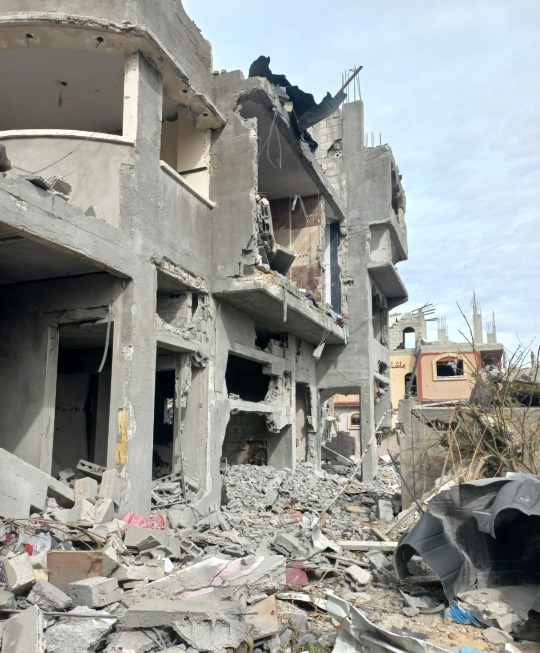
It was more than just bricks and mortar; it was where memories were crafted, where laughter echoed through the walls, and where the sweet, comforting smell of freshly baked bread from your bakery filled the air every morning.
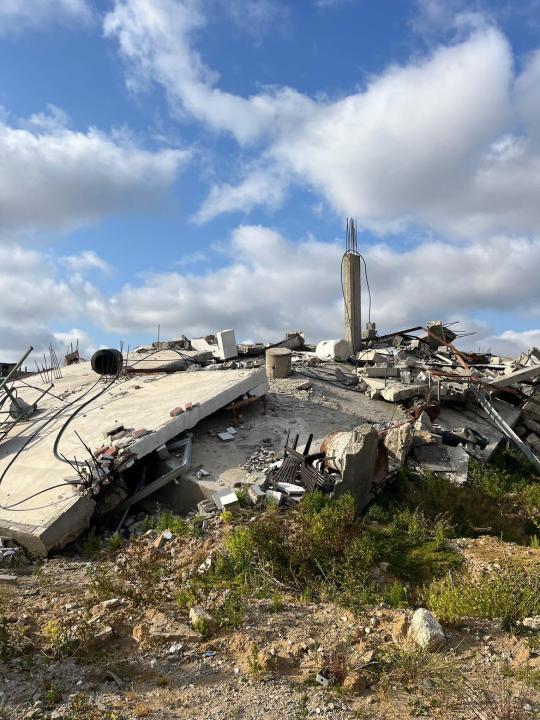
The bakery, your pride and joy, stood just a stone's throw from your home. People would line up, not just for bread, but for a moment of solace, to exchange stories over warm loaves, to feel a fleeting sense of normalcy amidst the hardships that surrounded them.But then the war came, a relentless force that shattered everything in its path.
The first attack happened without warning, during the invasion. You had already fled, along with your family, but you couldn't shake the haunting thoughts of your home and bakery, the places that represented so much of who you were. News reached you later, like a knife to the heart—your house was partially destroyed. The living room where you once sat with your children, the kitchen where you shared meals, all reduced to rubble. It was a blow, but still, part of it stood, defying the devastation around it, just as you had always done.In the chaos of that day, you had hoped, however faintly, that maybe, just maybe, you could rebuild.But the hope was short-lived.
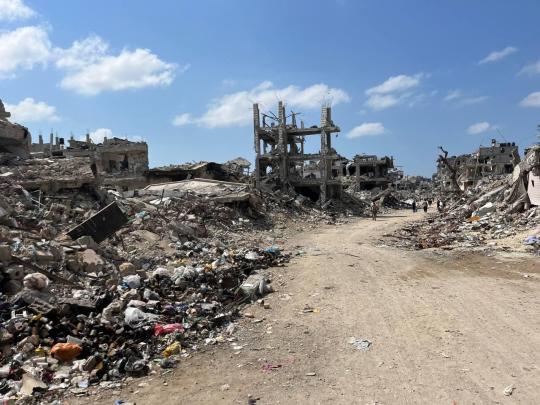
A few days later, the bombs fell again, this time with a finality that took your breath away. The entire area was leveled.
Your home, your bakery, your neighbors' homes—nothing but dust and debris remained, erased as if they had never existed.
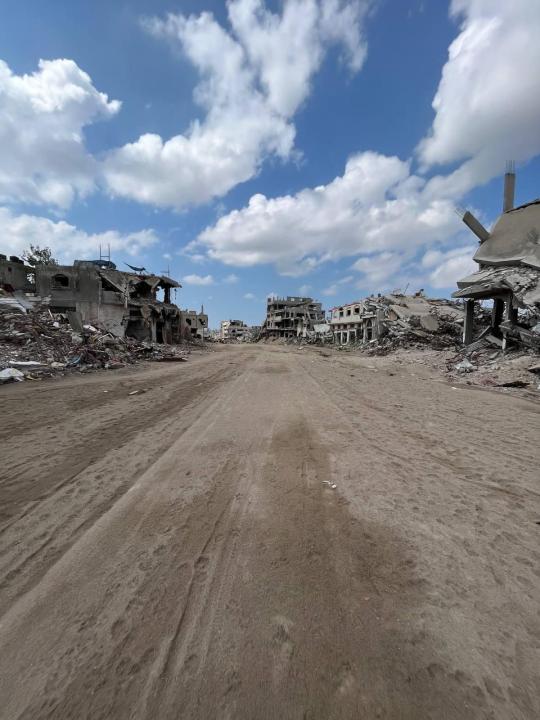
The bakery that had once nourished the souls and bodies of the community was gone, swallowed by the unforgiving storm of war.
You couldn’t help but think of the people who came every morning for their bread—the elderly woman who always asked for extra crusty loaves, the children who ran to the counter with wide-eyed excitement, the men who sat and talked over tea. All of it, gone.In the aftermath, standing before the rubble, you couldn’t recognize the place where you had lived and worked for so many years.
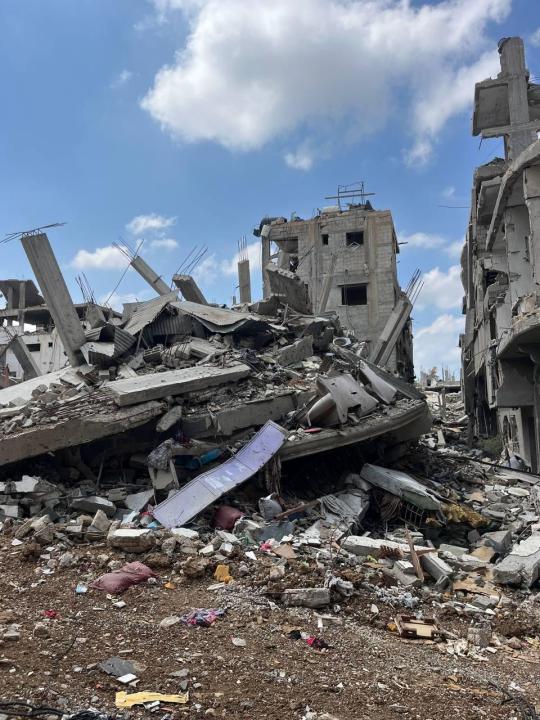
It felt like the heart of Shuja'iyya had been torn out. There was no longer the comforting smell of dough rising, no warmth from the ovens that had once baked countless loaves, no laughter from within your home.But even in the devastation, a part of you believed in the strength of the people of Gaza, in your own strength. The war could take away the walls, the bakery, the home—but it couldn’t erase the memories, the love, or the determination to rebuild. It couldn’t extinguish the spirit that had always guided you through the hardest of times.Someday, you promised yourself, you would build again.
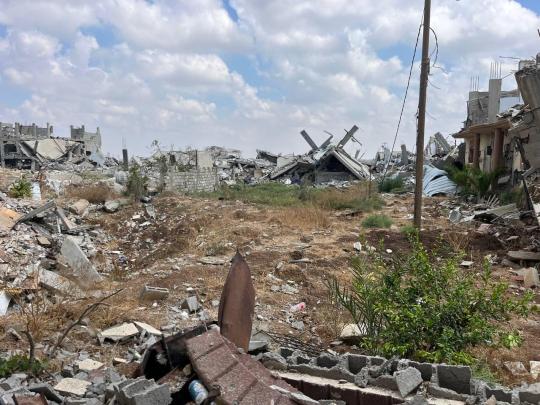
Here is my home, in the first ground entry of the brutal occupation into the Shuja'iyya neighborhood in Gaza, and it is partially damaged.
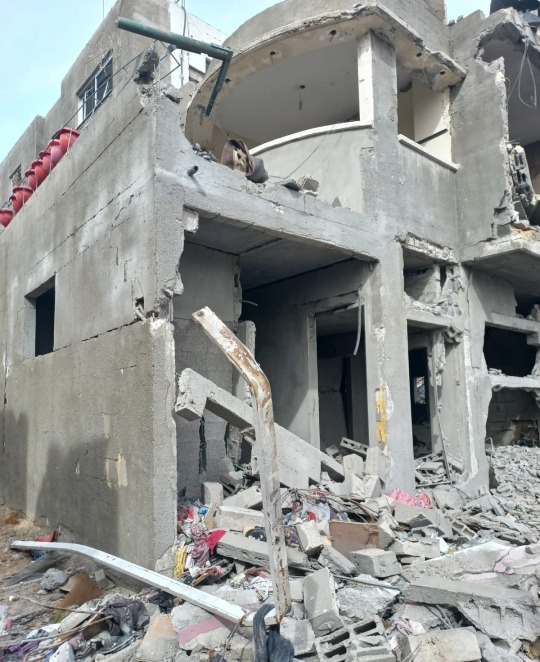
Here are pictures showing the extent of the total destruction of my house and the entire area, after the neighborhood was bombed by airstrikes.
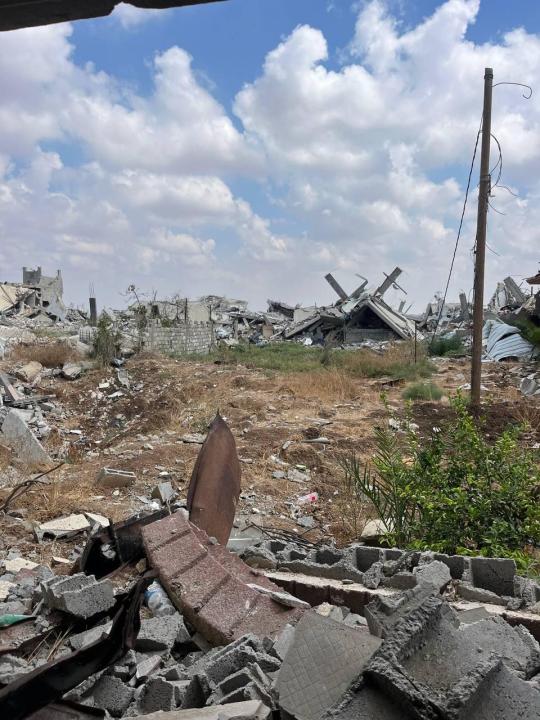
This video shows the extent of the devastation and destruction in the Shuja'iyya neighborhood.
69 notes
·
View notes
Note
Hi, I am Ahmed from Palestine, from the northern part of Gaza City. I am 33 years old, married, and a father of two children. I live in the Jabalia refugee camp with my family, which consists of 19 members, in a four-story house.
Since the beginning of the war on Gaza on October 7th, life in northern Gaza has been extremely difficult, lacking basic necessities due to the siege imposed by the Israeli army on the northern part of the Gaza Strip. The occupation has blocked food, medicine, water, electricity, and even communication networks. Thousands of airstrikes have been carried out, and hundreds of massacres have been committed, mostly affecting innocent civilians, the majority of whom are children and women. The infrastructure, thousands of homes, and civilian facilities have been destroyed.
On May 12th, 2024, the Israeli army besieged the Jabalia camp for the second time and ordered us to evacuate, informing us that it was a military operation zone and a dangerous combat area. We were forced to leave our homes in the camp and flee under heavy bombardment and intense gunfire, navigating through the rubble and bodies lying in the streets and on the roads. We became homeless, with no food or water. During this difficult siege, I lost two of my brothers, Abdullah, 30 years old, and Atallah, 26 years old, due to random shelling and airstrikes on the camp.
Why am I collecting donations?
After more than 15 months of war, on January 19th, 2025, the ceasefire came into effect, and we returned to the camp to check on our home. However, we were shocked by the extent of the destruction and devastation in the camp. The homes had turned into piles of rubble, and we could no longer recognize the places or roads due to the scale of the damage. Our house was completely destroyed, leaving us homeless. Now, my family and I live in a small tent that is insufficient for the number of family members. It offers no privacy, no bathroom, no kitchen, and it does not protect us from the summer heat or the winter cold. We are living in an overcrowded environment with displaced people, chaos, piles of garbage, and the spread of diseases, especially among the displaced children.
This war has forced us to live in extremely harsh conditions and an environment that is unfit for human life. We continue to suffer every day from the ongoing war, repeated displacement, lack of resources and essentials, fear, pain, and oppression. Not to mention the hardship of fetching water, standing in long queues for basic needs, and struggling to find food—another challenge added to our suffering in this devastating war that is destroying people, buildings, trees, and animals. All of this has exhausted our bodies and deeply affected our mental well-being.
Therefore, I am reaching out to you through this humanitarian platform to help me support my family, rebuild our destroyed home, and contribute to providing the basic necessities of life so that I can live with my family with dignity and freedom.
• How will these donations be used?
1) An apartment will be rented to temporarily house my family until the reconstruction of the destroyed house is completed, as an alternative to a tent, at a cost of $600 per month for at least two years. (An estimated total cost of $14,000 over the two years.)
2) Purchase the basic tools and equipment necessary to furnish the rented apartment at an estimated cost of $5,000.
3) Purchase clothing and basic necessities for all family members at an estimated cost of $6,000.
4) Remove the rubble of the destroyed house and rebuild it at an estimated cost of $140,000.
5) Purchase the tools and equipment necessary to furnish all apartments in the new house at an estimated cost of $35,000.
• How does your donation and support make a difference?
Your support and donation is a noble humanitarian cause that supports and strengthens our resilience during the war. This contribution, even if it is small, will make a huge difference in my life and the life of my family.
Please help us to live in safety and peace, to start over to achieve our ambitions and dreams, and to create a safe environment for our children that will provide them with a bright future.
.
#free palestine#free gaza#gaza#gaza strip#save palestine#gaza genocide#palestine#gazaunderattack#i stand with palestine
22 notes
·
View notes
Note
Hi, I am Ahmed from Palestine, from the northern part of Gaza City. I am 33 years old, married, and a father of two children. I live in the Jabalia refugee camp with my family, which consists of 19 members, in a four-story house.
Since the beginning of the war on Gaza on October 7th, life in northern Gaza has been extremely difficult, lacking basic necessities due to the siege imposed by the Israeli army on the northern part of the Gaza Strip. The occupation has blocked food, medicine, water, electricity, and even communication networks. Thousands of airstrikes have been carried out, and hundreds of massacres have been committed, mostly affecting innocent civilians, the majority of whom are children and women. The infrastructure, thousands of homes, and civilian facilities have been destroyed.
On May 12th, 2024, the Israeli army besieged the Jabalia camp for the second time and ordered us to evacuate, informing us that it was a military operation zone and a dangerous combat area. We were forced to leave our homes in the camp and flee under heavy bombardment and intense gunfire, navigating through the rubble and bodies lying in the streets and on the roads. We became homeless, with no food or water. During this difficult siege, I lost two of my brothers, Abdullah, 30 years old, and Atallah, 26 years old, due to random shelling and airstrikes on the camp.
Why am I collecting donations?
After more than 15 months of war, on January 19th, 2025, the ceasefire came into effect, and we returned to the camp to check on our home. However, we were shocked by the extent of the destruction and devastation in the camp. The homes had turned into piles of rubble, and we could no longer recognize the places or roads due to the scale of the damage. Our house was completely destroyed, leaving us homeless. Now, my family and I live in a small tent that is insufficient for the number of family members. It offers no privacy, no bathroom, no kitchen, and it does not protect us from the summer heat or the winter cold. We are living in an overcrowded environment with displaced people, chaos, piles of garbage, and the spread of diseases, especially among the displaced children.
This war has forced us to live in extremely harsh conditions and an environment that is unfit for human life. We continue to suffer every day from the ongoing war, repeated displacement, lack of resources and essentials, fear, pain, and oppression. Not to mention the hardship of fetching water, standing in long queues for basic needs, and struggling to find food—another challenge added to our suffering in this devastating war that is destroying people, buildings, trees, and animals. All of this has exhausted our bodies and deeply affected our mental well-being.
Therefore, I am reaching out to you through this humanitarian platform to help me support my family, rebuild our destroyed home, and contribute to providing the basic necessities of life so that I can live with my family with dignity and freedom.
• How will these donations be used?
1) An apartment will be rented to temporarily house my family until the reconstruction of the destroyed house is completed, as an alternative to a tent, at a cost of $600 per month for at least two years. (An estimated total cost of $14,000 over the two years.)
2) Purchase the basic tools and equipment necessary to furnish the rented apartment at an estimated cost of $5,000.
3) Purchase clothing and basic necessities for all family members at an estimated cost of $6,000.
4) Remove the rubble of the destroyed house and rebuild it at an estimated cost of $140,000.
5) Purchase the tools and equipment necessary to furnish all apartments in the new house at an estimated cost of $35,000.
• How does your donation and support make a difference?
Your support and donation is a noble humanitarian cause that supports and strengthens our resilience during the war. This contribution, even if it is small, will make a huge difference in my life and the life of my family.
Please help us to live in safety and peace, to start over to achieve our ambitions and dreams, and to create a safe environment for our children that will provide them with a bright future.
I truly wish I could contribute financially at this moment, but while I’m unable to donate, I want you to know that I am here to support you in every way I can.
I will share your post, spread awareness, and ensure as many kind and compassionate people as possible see your message.
Please know that my heart is with you and your family. I can only imagine how difficult this time must be, but you are incredibly strong, and you are surrounded by people who want to uplift you. I am keeping you in my thoughts and sending you all the love, comfort, and strength in the world.
Stay strong, hold onto hope, and know that brighter days are coming. 💕🍉
#gofundme#palestinian genocide#free gaza#gaza strip#gaza#i stand with palestine#free palestine#from the river to the sea palestine will be free#palestine#gaza under attack#aid for gaza#palestine aid#support palestine#gaza genocide#gazaunderattack#save gaza#gaza gofundme#stand with gaza#help gaza#palestine gfm#gfm#gaza gfm#vetted gfm#save palestine#all eyes on palestine#palestine news#palestine fundraiser#pro palestine#go fund them#gaza fundraiser
25 notes
·
View notes
Note
Hi, I am Ahmed from Palestine, from the northern part of Gaza City. I am 33 years old, married, and a father of two children. I live in the Jabalia refugee camp with my family, which consists of 19 members, in a four-story house.
Since the beginning of the war on Gaza on October 7th, life in northern Gaza has been extremely difficult, lacking basic necessities due to the siege imposed by the Israeli army on the northern part of the Gaza Strip. The occupation has blocked food, medicine, water, electricity, and even communication networks. Thousands of airstrikes have been carried out, and hundreds of massacres have been committed, mostly affecting innocent civilians, the majority of whom are children and women. The infrastructure, thousands of homes, and civilian facilities have been destroyed.
On May 12th, 2024, the Israeli army besieged the Jabalia camp for the second time and ordered us to evacuate, informing us that it was a military operation zone and a dangerous combat area. We were forced to leave our homes in the camp and flee under heavy bombardment and intense gunfire, navigating through the rubble and bodies lying in the streets and on the roads. We became homeless, with no food or water. During this difficult siege, I lost two of my brothers, Abdullah, 30 years old, and Atallah, 26 years old, due to random shelling and airstrikes on the camp.
Why am I collecting donations?
After more than 15 months of war, on January 19th, 2025, the ceasefire came into effect, and we returned to the camp to check on our home. However, we were shocked by the extent of the destruction and devastation in the camp. The homes had turned into piles of rubble, and we could no longer recognize the places or roads due to the scale of the damage. Our house was completely destroyed, leaving us homeless. Now, my family and I live in a small tent that is insufficient for the number of family members. It offers no privacy, no bathroom, no kitchen, and it does not protect us from the summer heat or the winter cold. We are living in an overcrowded environment with displaced people, chaos, piles of garbage, and the spread of diseases, especially among the displaced children.
This war has forced us to live in extremely harsh conditions and an environment that is unfit for human life. We continue to suffer every day from the ongoing war, repeated displacement, lack of resources and essentials, fear, pain, and oppression. Not to mention the hardship of fetching water, standing in long queues for basic needs, and struggling to find food—another challenge added to our suffering in this devastating war that is destroying people, buildings, trees, and animals. All of this has exhausted our bodies and deeply affected our mental well-being.
Therefore, I am reaching out to you through this humanitarian platform to help me support my family, rebuild our destroyed home, and contribute to providing the basic necessities of life so that I can live with my family with dignity and freedom.
• How will these donations be used?
1) An apartment will be rented to temporarily house my family until the reconstruction of the destroyed house is completed, as an alternative to a tent, at a cost of $600 per month for at least two years. (An estimated total cost of $14,000 over the two years.)
2) Purchase the basic tools and equipment necessary to furnish the rented apartment at an estimated cost of $5,000.
3) Purchase clothing and basic necessities for all family members at an estimated cost of $6,000.
4) Remove the rubble of the destroyed house and rebuild it at an estimated cost of $140,000.
5) Purchase the tools and equipment necessary to furnish all apartments in the new house at an estimated cost of $35,000.
• How does your donation and support make a difference?
Your support and donation is a noble humanitarian cause that supports and strengthens our resilience during the war. This contribution, even if it is small, will make a huge difference in my life and the life of my family.
Please help us to live in safety and peace, to start over to achieve our ambitions and dreams, and to create a safe environment for our children that will provide them with a bright future.
!!!!!!!!!
20 notes
·
View notes
Note
Hi, I am Ahmed from Palestine, from the northern part of Gaza City. I am 33 years old, married, and a father of two children. I live in the Jabalia refugee camp with my family, which consists of 19 members, in a four-story house.
Since the beginning of the war on Gaza on October 7th, life in northern Gaza has been extremely difficult, lacking basic necessities due to the siege imposed by the Israeli army on the northern part of the Gaza Strip. The occupation has blocked food, medicine, water, electricity, and even communication networks. Thousands of airstrikes have been carried out, and hundreds of massacres have been committed, mostly affecting innocent civilians, the majority of whom are children and women. The infrastructure, thousands of homes, and civilian facilities have been destroyed.
On May 12th, 2024, the Israeli army besieged the Jabalia camp for the second time and ordered us to evacuate, informing us that it was a military operation zone and a dangerous combat area. We were forced to leave our homes in the camp and flee under heavy bombardment and intense gunfire, navigating through the rubble and bodies lying in the streets and on the roads. We became homeless, with no food or water. During this difficult siege, I lost two of my brothers, Abdullah, 30 years old, and Atallah, 26 years old, due to random shelling and airstrikes on the camp.
Why am I collecting donations?
After more than 15 months of war, on January 19th, 2025, the ceasefire came into effect, and we returned to the camp to check on our home. However, we were shocked by the extent of the destruction and devastation in the camp. The homes had turned into piles of rubble, and we could no longer recognize the places or roads due to the scale of the damage. Our house was completely destroyed, leaving us homeless. Now, my family and I live in a small tent that is insufficient for the number of family members. It offers no privacy, no bathroom, no kitchen, and it does not protect us from the summer heat or the winter cold. We are living in an overcrowded environment with displaced people, chaos, piles of garbage, and the spread of diseases, especially among the displaced children.
This war has forced us to live in extremely harsh conditions and an environment that is unfit for human life. We continue to suffer every day from the ongoing war, repeated displacement, lack of resources and essentials, fear, pain, and oppression. Not to mention the hardship of fetching water, standing in long queues for basic needs, and struggling to find food—another challenge added to our suffering in this devastating war that is destroying people, buildings, trees, and animals. All of this has exhausted our bodies and deeply affected our mental well-being.
Therefore, I am reaching out to you through this humanitarian platform to help me support my family, rebuild our destroyed home, and contribute to providing the basic necessities of life so that I can live with my family with dignity and freedom.
• How will these donations be used?
1) An apartment will be rented to temporarily house my family until the reconstruction of the destroyed house is completed, as an alternative to a tent, at a cost of $600 per month for at least two years. (An estimated total cost of $14,000 over the two years.)
2) Purchase the basic tools and equipment necessary to furnish the rented apartment at an estimated cost of $5,000.
3) Purchase clothing and basic necessities for all family members at an estimated cost of $6,000.
4) Remove the rubble of the destroyed house and rebuild it at an estimated cost of $140,000.
5) Purchase the tools and equipment necessary to furnish all apartments in the new house at an estimated cost of $35,000.
• How does your donation and support make a difference?
Your support and donation is a noble humanitarian cause that supports and strengthens our resilience during the war. This contribution, even if it is small, will make a huge difference in my life and the life of my family.
Please help us to live in safety and peace, to start over to achieve our ambitions and dreams, and to create a safe environment for our children that will provide them with a bright future.
#leve palestina#needs boosting and donations#free palestine#free gaza#gaza#gaza aid#palestine#palestine aid#gaza genocide#gaza strip
20 notes
·
View notes
Note
Hi, I am Ahmed from Palestine, from the northern part of Gaza City. I am 33 years old, married, and a father of two children. I live in the Jabalia refugee camp with my family, which consists of 19 members, in a four-story house.
Since the beginning of the war on Gaza on October 7th, life in northern Gaza has been extremely difficult, lacking basic necessities due to the siege imposed by the Israeli army on the northern part of the Gaza Strip. The occupation has blocked food, medicine, water, electricity, and even communication networks. Thousands of airstrikes have been carried out, and hundreds of massacres have been committed, mostly affecting innocent civilians, the majority of whom are children and women. The infrastructure, thousands of homes, and civilian facilities have been destroyed.
On May 12th, 2024, the Israeli army besieged the Jabalia camp for the second time and ordered us to evacuate, informing us that it was a military operation zone and a dangerous combat area. We were forced to leave our homes in the camp and flee under heavy bombardment and intense gunfire, navigating through the rubble and bodies lying in the streets and on the roads. We became homeless, with no food or water. During this difficult siege, I lost two of my brothers, Abdullah, 30 years old, and Atallah, 26 years old, due to random shelling and airstrikes on the camp.
Why am I collecting donations?
After more than 15 months of war, on January 19th, 2025, the ceasefire came into effect, and we returned to the camp to check on our home. However, we were shocked by the extent of the destruction and devastation in the camp. The homes had turned into piles of rubble, and we could no longer recognize the places or roads due to the scale of the damage. Our house was completely destroyed, leaving us homeless. Now, my family and I live in a small tent that is insufficient for the number of family members. It offers no privacy, no bathroom, no kitchen, and it does not protect us from the summer heat or the winter cold. We are living in an overcrowded environment with displaced people, chaos, piles of garbage, and the spread of diseases, especially among the displaced children.
This war has forced us to live in extremely harsh conditions and an environment that is unfit for human life. We continue to suffer every day from the ongoing war, repeated displacement, lack of resources and essentials, fear, pain, and oppression. Not to mention the hardship of fetching water, standing in long queues for basic needs, and struggling to find food—another challenge added to our suffering in this devastating war that is destroying people, buildings, trees, and animals. All of this has exhausted our bodies and deeply affected our mental well-being.
Therefore, I am reaching out to you through this humanitarian platform to help me support my family, rebuild our destroyed home, and contribute to providing the basic necessities of life so that I can live with my family with dignity and freedom.
• How will these donations be used?
1) An apartment will be rented to temporarily house my family until the reconstruction of the destroyed house is completed, as an alternative to a tent, at a cost of $600 per month for at least two years. (An estimated total cost of $14,000 over the two years.)
2) Purchase the basic tools and equipment necessary to furnish the rented apartment at an estimated cost of $5,000.
3) Purchase clothing and basic necessities for all family members at an estimated cost of $6,000.
4) Remove the rubble of the destroyed house and rebuild it at an estimated cost of $140,000.
5) Purchase the tools and equipment necessary to furnish all apartments in the new house at an estimated cost of $35,000.
• How does your donation and support make a difference?
Your support and donation is a noble humanitarian cause that supports and strengthens our resilience during the war. This contribution, even if it is small, will make a huge difference in my life and the life of my family.
Please help us to live in safety and peace, to start over to achieve our ambitions and dreams, and to create a safe environment for our children that will provide them with a bright future.
!!!!!
#all eyes on palestine#free palestine#free gaza#gaza genocide#gaza#gaza strip#gazaunderattack#i stand with palestine#palestine fundraiser#save palestine#from the river to the sea palestine will be free#gaza fundraiser#fundraiser#go fund them
22 notes
·
View notes
Note
Hi, I am Ahmed from Palestine, from the northern part of Gaza City. I am 33 years old, married, and a father of two children. I live in the Jabalia refugee camp with my family, which consists of 19 members, in a four-story house.
Since the beginning of the war on Gaza on October 7th, life in northern Gaza has been extremely difficult, lacking basic necessities due to the siege imposed by the Israeli army on the northern part of the Gaza Strip. The occupation has blocked food, medicine, water, electricity, and even communication networks. Thousands of airstrikes have been carried out, and hundreds of massacres have been committed, mostly affecting innocent civilians, the majority of whom are children and women. The infrastructure, thousands of homes, and civilian facilities have been destroyed.
On May 12th, 2024, the Israeli army besieged the Jabalia camp for the second time and ordered us to evacuate, informing us that it was a military operation zone and a dangerous combat area. We were forced to leave our homes in the camp and flee under heavy bombardment and intense gunfire, navigating through the rubble and bodies lying in the streets and on the roads. We became homeless, with no food or water. During this difficult siege, I lost two of my brothers, Abdullah, 30 years old, and Atallah, 26 years old, due to random shelling and airstrikes on the camp.
Why am I collecting donations?
After more than 15 months of war, on January 19th, 2025, the ceasefire came into effect, and we returned to the camp to check on our home. However, we were shocked by the extent of the destruction and devastation in the camp. The homes had turned into piles of rubble, and we could no longer recognize the places or roads due to the scale of the damage. Our house was completely destroyed, leaving us homeless. Now, my family and I live in a small tent that is insufficient for the number of family members. It offers no privacy, no bathroom, no kitchen, and it does not protect us from the summer heat or the winter cold. We are living in an overcrowded environment with displaced people, chaos, piles of garbage, and the spread of diseases, especially among the displaced children.
This war has forced us to live in extremely harsh conditions and an environment that is unfit for human life. We continue to suffer every day from the ongoing war, repeated displacement, lack of resources and essentials, fear, pain, and oppression. Not to mention the hardship of fetching water, standing in long queues for basic needs, and struggling to find food—another challenge added to our suffering in this devastating war that is destroying people, buildings, trees, and animals. All of this has exhausted our bodies and deeply affected our mental well-being.
Therefore, I am reaching out to you through this humanitarian platform to help me support my family, rebuild our destroyed home, and contribute to providing the basic necessities of life so that I can live with my family with dignity and freedom.
• How will these donations be used?
1) An apartment will be rented to temporarily house my family until the reconstruction of the destroyed house is completed, as an alternative to a tent, at a cost of $600 per month for at least two years. (An estimated total cost of $14,000 over the two years.)
2) Purchase the basic tools and equipment necessary to furnish the rented apartment at an estimated cost of $5,000.
3) Purchase clothing and basic necessities for all family members at an estimated cost of $6,000.
4) Remove the rubble of the destroyed house and rebuild it at an estimated cost of $140,000.
5) Purchase the tools and equipment necessary to furnish all apartments in the new house at an estimated cost of $35,000.
• How does your donation and support make a difference?
Your support and donation is a noble humanitarian cause that supports and strengthens our resilience during the war. This contribution, even if it is small, will make a huge difference in my life and the life of my family.
Please help us to live in safety and peace, to start over to achieve our ambitions and dreams, and to create a safe environment for our children that will provide them with a bright future.
.
18 notes
·
View notes
Note
Hi, I am Ahmed from Palestine, from the northern part of Gaza City. I am 33 years old, married, and a father of two children. I live in the Jabalia refugee camp with my family, which consists of 19 members, in a four-story house.
Since the beginning of the war on Gaza on October 7th, life in northern Gaza has been extremely difficult, lacking basic necessities due to the siege imposed by the Israeli army on the northern part of the Gaza Strip. The occupation has blocked food, medicine, water, electricity, and even communication networks. Thousands of airstrikes have been carried out, and hundreds of massacres have been committed, mostly affecting innocent civilians, the majority of whom are children and women. The infrastructure, thousands of homes, and civilian facilities have been destroyed.
On May 12th, 2024, the Israeli army besieged the Jabalia camp for the second time and ordered us to evacuate, informing us that it was a military operation zone and a dangerous combat area. We were forced to leave our homes in the camp and flee under heavy bombardment and intense gunfire, navigating through the rubble and bodies lying in the streets and on the roads. We became homeless, with no food or water. During this difficult siege, I lost two of my brothers, Abdullah, 30 years old, and Atallah, 26 years old, due to random shelling and airstrikes on the camp.
Why am I collecting donations?
After more than 15 months of war, on January 19th, 2025, the ceasefire came into effect, and we returned to the camp to check on our home. However, we were shocked by the extent of the destruction and devastation in the camp. The homes had turned into piles of rubble, and we could no longer recognize the places or roads due to the scale of the damage. Our house was completely destroyed, leaving us homeless. Now, my family and I live in a small tent that is insufficient for the number of family members. It offers no privacy, no bathroom, no kitchen, and it does not protect us from the summer heat or the winter cold. We are living in an overcrowded environment with displaced people, chaos, piles of garbage, and the spread of diseases, especially among the displaced children.
This war has forced us to live in extremely harsh conditions and an environment that is unfit for human life. We continue to suffer every day from the ongoing war, repeated displacement, lack of resources and essentials, fear, pain, and oppression. Not to mention the hardship of fetching water, standing in long queues for basic needs, and struggling to find food—another challenge added to our suffering in this devastating war that is destroying people, buildings, trees, and animals. All of this has exhausted our bodies and deeply affected our mental well-being.
Therefore, I am reaching out to you through this humanitarian platform to help me support my family, rebuild our destroyed home, and contribute to providing the basic necessities of life so that I can live with my family with dignity and freedom.
• How will these donations be used?
1) An apartment will be rented to temporarily house my family until the reconstruction of the destroyed house is completed, as an alternative to a tent, at a cost of $600 per month for at least two years. (An estimated total cost of $14,000 over the two years.)
2) Purchase the basic tools and equipment necessary to furnish the rented apartment at an estimated cost of $5,000.
3) Purchase clothing and basic necessities for all family members at an estimated cost of $6,000.
4) Remove the rubble of the destroyed house and rebuild it at an estimated cost of $140,000.
5) Purchase the tools and equipment necessary to furnish all apartments in the new house at an estimated cost of $35,000.
• How does your donation and support make a difference?
Your support and donation is a noble humanitarian cause that supports and strengthens our resilience during the war. This contribution, even if it is small, will make a huge difference in my life and the life of my family.
Please help us to live in safety and peace, to start over to achieve our ambitions and dreams, and to create a safe environment for our children that will provide them with a bright future.
Please, reblog and donate if you can!
Free Palestine🇵🇸🇵🇸🇵🇸
#free palestine#free gaza#palestine#gaza#gaza strip#gazaunderattack#gazaunderfire#gaza genocide#donations#support#help#gofundme#go fund them#from the river to the sea palestine will be free
14 notes
·
View notes